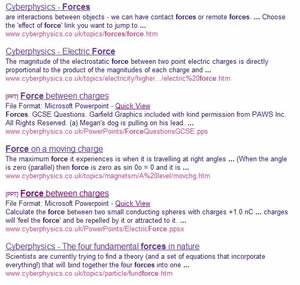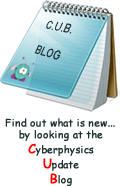Welcome to you 'student teachers of physics' - this page tells you how best to use this site! I hope that you will find this site useful. Starting out as a teacher is daunting and exhausting. I have had positive feedback from student teachers who have used this site to research lesson material and to look for advice on how to tackle misconceptions. I was a trained mentor for PGCE students from Birmingham University and always enjoyed having PGCE students 'under my wing'. My resources have been widely distributed by theTES site both in the UK and in the Australian section. I have had positive feedback from teachers who have used this site to research lesson material and to direct 'revising pupils' to... and I hope you too will find it a useful tool. I have listed 'site jumps' that I think you will find useful. Take a look at the links. Some of the subjects covered relate to the UK educational system - others will be useful to students from any country.
The 'Exam preparation' menu choice from the top bar, include as 'exam skills' section that will take you to a selection of helpful articles on examination technique, revision tips etc. It is a useful section to look at if you want to improve the general skills of your pupils - setting them the task of reading some of this material and then making peer presentations would be a possible homeowrk task. The 'UK Key Stages' choice in that menu takes you to the three secondary school 'key stages' that are used in the UK educational system and there are sections of example questions and their solutions that might prove useful in lessons or to be set as homework. Solutions can be called up onto a whiteboard so that the students can mark their own work.
Each stage also has 'interactive syllabuses' which link to background pages where relevant. Finding the Physics Information you needThe topic menu bar (also on the left) allows you to jump straight to a page of information on the topic you are interested in. A dropdown menu allows you to find sub-topics within the general area. But sometimes my categorisation of a topic might not agree with yours and a topic might be difficult to locate. You can therefore also search within this site for any word that interests you. Just use the Google search facility at the top of the page. Type in a word like 'force' and a page of links to pages that mention 'force' within this site will be listed for you. The graphic below shows a small fraction of the pages that will appear... The Contact tab gives links not only to a 'contact page' so that you can e-mail me but also My YouTube Page which hosts all of the animations I have uploaded and other related sites. Useful Extras include Wide Reading which gives links to science news stories. These can be used as a launchpad for research homeworks. The links are to (mainly BBC) news stroies that relate to science discoveries or applications. While looking after PGCE students I had to not only share their duties as a physics teacher, but also those relating to wider school activities. The following links related to the school I taught in (at the time I taught!) and are therefore not relevant to you specifically. However you may find some of the ideas and recommendations in them interesting and they may well apply to the school you are based in. At any rate they hopefully will make you think about the wider aspects of your job... and prompt questions that you can ask of your supervisor in the school to which you are allocated.
Check out these sections too - they are more general and relate to subject teaching:
|
Follow me...
|






